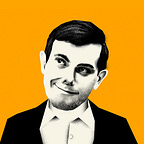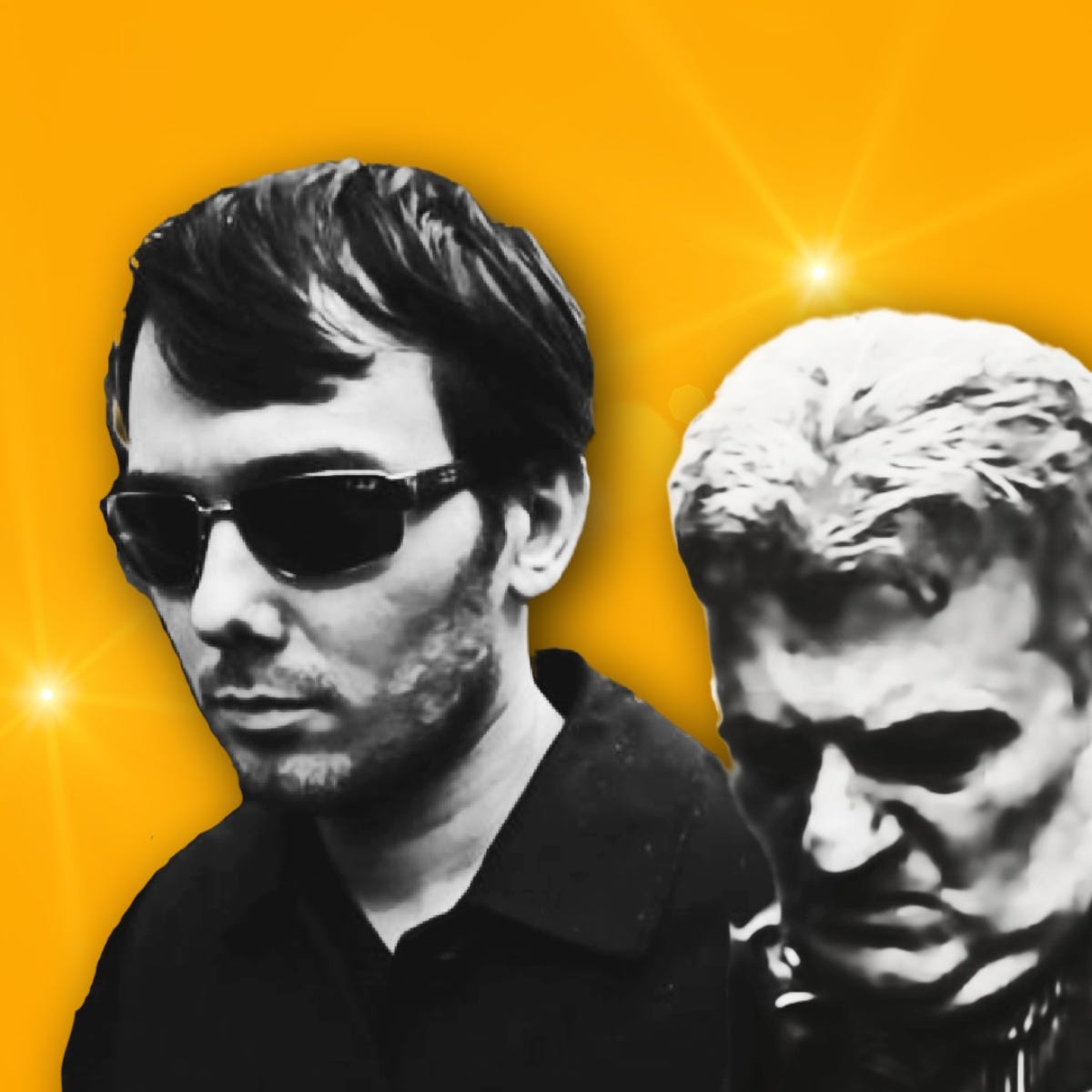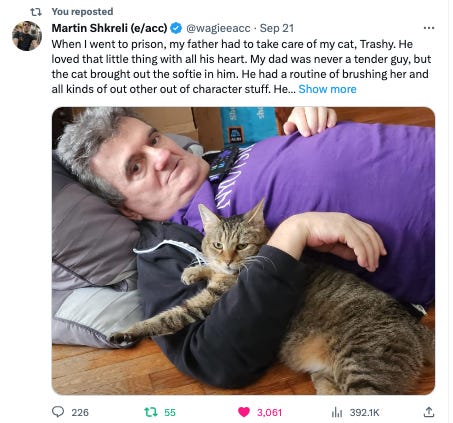As soon as Humberto coiled his arm around my waist, I knew I wanted to take him to bed. He was a horror filmmaker and a freelance photographer, born in Colombia and raised in New Jersey. We met over a dating app in 2021 as Covid was winding down.
It wasn’t the first time I’d been on a date since my Martin Shkreli fiasco, but this one especially reassured me that I wouldn’t be tarnished with a scarlet letter for life.
Restaurants in New York still required masks until you sat down, so when Humberto first walked into the Harlem bistro where we met I saw only his eyes, two deep brown empathetic pools.
He exuded easy masculinity — direct but not overbearing and amicable without being desperate to impress. Shaped by past years of competitive distance swimming, he was well-muscled but not brawny like a gym rat. I liked him immediately.
Once properly lubricated with margaritas, we gave each other a glimpse of the skeletons in our closets. He disclosed his complicated family history: His father was not really in the picture; he cared for his mother who had health problems; and he thought his family might have left Colombia to escape drug cartels.
Then it was my turn. “Google me,” I said, simply. “I want you to see what you’re getting into.”
He shot me a quizzical look. I nodded encouragingly, and his eyes went down to his phone. The ends of his lips turned up into a smile and he laughed. “Well, everyone has something in their past, don’t they?” He said. It was exactly what I needed to hear.
Martin was a strange part of my former life and otherwise irrelevant to Humberto. There was no cloud of infamy over me in Humberto’s eyes. In the two years I’ve now known him, he has never once expressed concern about reputational blowback – not mine or his own. He didn’t even mind being mentioned in this book. (I asked for his permission.) Life happened, you made the best of it, and then you moved on. It was as simple as that.
I was moving on, although there were hurdles. Job hunting had grown more challenging because risk-averse corporate managers were wary of my controversial persona. Luckily, the types of people I most enjoyed working for, forward-thinking entrepreneurs, tended to recognize my value.
Every so often, a flurry of haters on the internet would be reminded of my existence and randomly tweet about how I had “ruined” my life. I sometimes found these tweets and succumbed to the urge to reply that they were mistaken. The exchange either resulted in me making a new friend if they responded thoughtfully or a new enemy if they kept mocking me.
I was still processing everything that had happened. Memories paraded through my brain as if on a conveyor belt as I tried to sort through them. I thought of Martin in the prison visiting room and the glow that warmed his face when he saw me. His feelings for me might have clashed with how he wanted to be seen by his “fans” — as some sort of swaggering alpha male, I guess — but I knew they weren’t fake.
I thought of some of Martin’s more hilarious and disarming live streams, like when he picked apart and confounded people who called him on the phone just to insult him, and his creatively weird stunts like a Wu-Tang Clan-directed “dis” video with “goons” (some of his friends) lurking behind him.
I wondered if somewhere in a parallel universe, there was a Martin Shkreli who never got into hedge funds or pharmaceuticals and never raised drug prices, who instead plied his talents as a social satirist. Maybe that Martin Shkreli was as beloved as the one in this universe was hated.
And I thought about the happy moments with my ex-husband a decade earlier, before they were overwhelmed by bitter arguments.
Just like with Martin, Devin and I had bonded over a shared chip on our shoulders. Coming from a semi-working class background, Devin put himself through New York University by taking out six figures’ worth of loans. He ended up being able to pay them back by landing a job at a top-tier asset management firm where he analyzed bond portfolios. He also helped with college recruiting.
One lazy weekend morning, while we were lying in bed, he took out a folder full of resumes and essays from students at Harvard. We read them out loud to each other and laughed at the obvious “legacies,” like a student with a “III” after his name who waxed philosophical about a summer he spent backpacking around Europe. Neither Devin nor I had time or money in college for backpacking trips.
Stymying the progress of “moving on,” I still heard occasionally from Martin. His communications as his prison sentence wound down were all over the map. Sometimes he was warm and sentimental. Other times, I’d get a rude surprise in the form of an angst-ridden breakup letter.
“You are a very, very strong person,” he wrote in one such letter. He added that he wasn’t sure if we should talk in the future because it might be “too painful.” Too painful for whom — me or him? I wondered.
Nevertheless, we stayed in touch. Despite his enthusiastic reentry into society as a cult figure, making rounds at crypto parties and on podcasts, I came to understand that he struggled with agoraphobia. A young woman he dated for several months, who befriended me, told me he was having trouble completing his court-mandated community service because he got too anxious, and she worried he might be sent back to prison.
She wanted to keep him company at the thrift store where he did his service work to calm him down, but she was concerned a journalist might spot them on the way to the shop. Understandably, she wasn’t ready for life-altering public scrutiny just yet.
Having nothing to fear in that regard, I volunteered to go instead, and Martin surprisingly consented. I spent several hours one Sunday afternoon sorting through items with him in the thrift store basement, chatting and laughing like we always had.
But Martin would always be Martin — dysfunctional, flirting with disaster, and never addressing his shortcomings or taking full responsibility for his mistakes. Barely a week after he had shown me much kindness and gratitude for helping him endure his community service hours, his girlfriend texted me distraught: He was refusing to go again. I texted him directly and told him he was acting like a child. He responded childishly by blocking my number.
Martin’s relationship with the girlfriend eventually fizzled because of his immaturity and not taking her feelings seriously. He suffered another personal blow recently when his dad, Pashko, died suddenly of a heart attack. As a once kind of almost future daughter-in-law, I was particularly saddened by one aspect of the situation: Pashko had fathered four children but had no grandchildren. The closest he got was taking care of Martin’s cat Trashy.
I recalled an especially poignant piece of wisdom Pashko had bestowed on me in 2019 when he took me on a tour of the family’s Midwood neighborhood. Over a plate of kebabs he bought for me in a Turkish restaurant, he gave me a stern look. He told me that I had to “draw a line” with Martin and decide what behavior I found unacceptable from him. “Because he won’t,” Pashko said.
I did what Pashko advised. The line I drew – what I could not tolerate – was being pushed aside and disposed of without anyone knowing that I had ever been a meaningful part of Martin’s life. If I was going to take crazy risks, make sacrifices, and endure emotional hell for Martin, I didn’t want to hide all my efforts under a curtain of shame.
For so much of my life, I’d felt like I was going through the motions and following a script, trying to figure out what my “character” was supposed to be, what was supposed to motivate her, and how she was supposed to behave. Work and family life, it was all prewritten, based on lessons from my parents, my professors, my colleagues, and my mentors. My ex-husband also imposed views on what my priorities “should” be.
Then Martin happened and I tossed the script. I followed no one’s advice, just my intuition. I ended up in an unusual, uncomfortable, and yet enlightening place: on the other side of a media frame.
Here’s an example of what I mean: On the day of Martin Shkreli’s arrest in December 2015, he walked out of the Brooklyn federal courthouse into a mob of photographers. It was dark and rainy that early evening, but he wore sunglasses. The widely publicized photos captured what resembled a haughty celebrity, with his eyes hidden and his mouth tight and contemptuous, as cameras flashed just inches from his face.
Many of the photos included an older man walking close behind him, with a hand protectively on Martin’s arm. No one knew who the man was at the time. Some people assumed he was a driver or a bodyguard, enhancing the notion that Martin was some sort of untouchable wealthy jerk.
Looking at the photos years later, I recognized the man immediately: It was Pashko. Like any loving father of a wayward son (see our current president Joe Biden as an example), he was just trying to be supportive in a difficult moment. Knowing Martin much better than I had back in December 2015, I also sensed why he wore sunglasses: for psychic distance from the media throng (he was undoubtedly exhausted) rather than to look “cool.”
Not so long ago, it might have been normal for natural curiosity to take over the media cycle and for journalists to probe into the “most hated man in America” on a human level. But Martin ushered in an era when villains, once stamped as such in memes, could not be fleshed out or seen as three-dimensional characters anymore.
Social media made it frighteningly easy for facts to be overwritten by perception. Mainstream journalists often gave undue weight to emotional reactions that were based on misinformation or a lack of context. Sometimes they even encouraged those reactions…for clicks. Someone had to be a thorn in the side of the media establishment and stand up, awkwardly if necessary, to that nonsense. I was OK with that person being me.
On a personal level, the experience was also a net positive for me. When I left both Bloomberg and my ex-husband, I discovered how much mental energy I was using to maintain a toxic marriage and survive a brutally competitive career. I realized a lot of this energy was much better spent on my family — my parents, my brothers and their spouses, my extended family, and my niece and nephews — and on my friends.
And I realized I didn’t need a man in my life to be happy. But I did find it nice to have one in my life who didn’t heap ever-increasing expectations on my shoulders, as Devin did, or make me play guessing games about his affections or his mood, as Martin had.
For at least the time being, Humberto fit the bill.
As we walked out to the sidewalk after our first date back in 2021, he asked to kiss me, and I made up my mind about how the rest of the night would go. Back in my apartment, I nestled my head against his wide, warm chest, and I fell asleep easily, curled up with his sturdy arm over me like a weighted blanket.

















